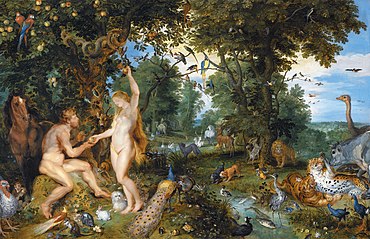
Back Erfsonde AF الخطيئة الأصلية Arabic الخطيئه الاصليه ARZ Pecáu orixinal AST İlk günah AZ Першародны грэх BE Първороден грях Bulgarian Pec'hed orin BR Pecat original Catalan Prvotní hřích Czech

Original sin is the Christian doctrine that holds that humans, through the fact of birth, inherit a tainted nature with a proclivity to sinful conduct in need of regeneration.[1] The biblical basis for the belief is generally found in Genesis 3 (the story of the expulsion of Adam and Eve from the Garden of Eden), in a line in Psalm 51:5 ("I was brought forth in iniquity, and in sin did my mother conceive me"),[2] and in Paul's Epistle to the Romans, 5:12-21 ("Therefore, just as sin entered the world through one man, and death through sin, and in this way death came to all people, because all sinned").[3][1]
This belief began to emerge in the 3rd century, but only became fully formed with the writings of Augustine of Hippo (354–430 AD), who was the first author to use the phrase "original sin" (Latin: peccatum originale).[4][5] Influenced by Augustine, the councils of Carthage (411–418 AD) and Orange (529 AD) brought theological speculation about original sin into the official lexicon of the Church.[6]
Protestant reformers such as Martin Luther and John Calvin equated original sin with concupiscence (or "hurtful desire"), affirming that it persisted even after baptism and completely destroyed freedom to do good, proposing that original sin involved a loss of free will except to sin.[7] The Jansenist movement, which the Roman Catholic Church declared heretical in 1653, also maintained that original sin destroyed freedom of will.[8] Instead, the Catholic Church declares that "Baptism, by imparting the life of Christ's grace, erases original sin and turns a man back towards God, but the consequences for nature, weakened and inclined to evil, persist in man and summon him to spiritual battle",[9] and that "weakened and diminished by Adam's fall, free will is yet not destroyed in the race."[10]
- ^ a b Vawter 1983, p. 420.
- ^ Psalm 51:5
- ^ Romans 5:12–21
- ^ Patte 2019, p. 892.
- ^ Cross 1966, p. 994.
- ^ Wiley 2002, p. 56.
- ^ Wilson 2018, pp. 157–187.
- ^ Forget 1910.
- ^ Cite error: The named reference
ccc405was invoked but never defined (see the help page). - ^ Cite error: The named reference
CoT.VI.iwas invoked but never defined (see the help page).